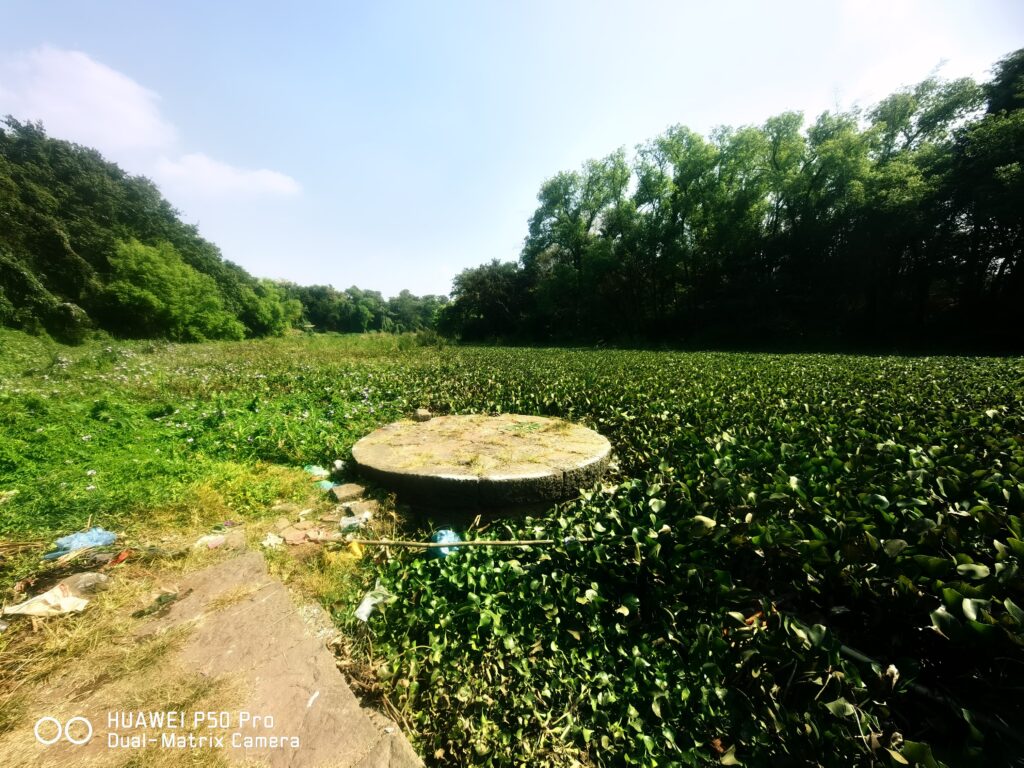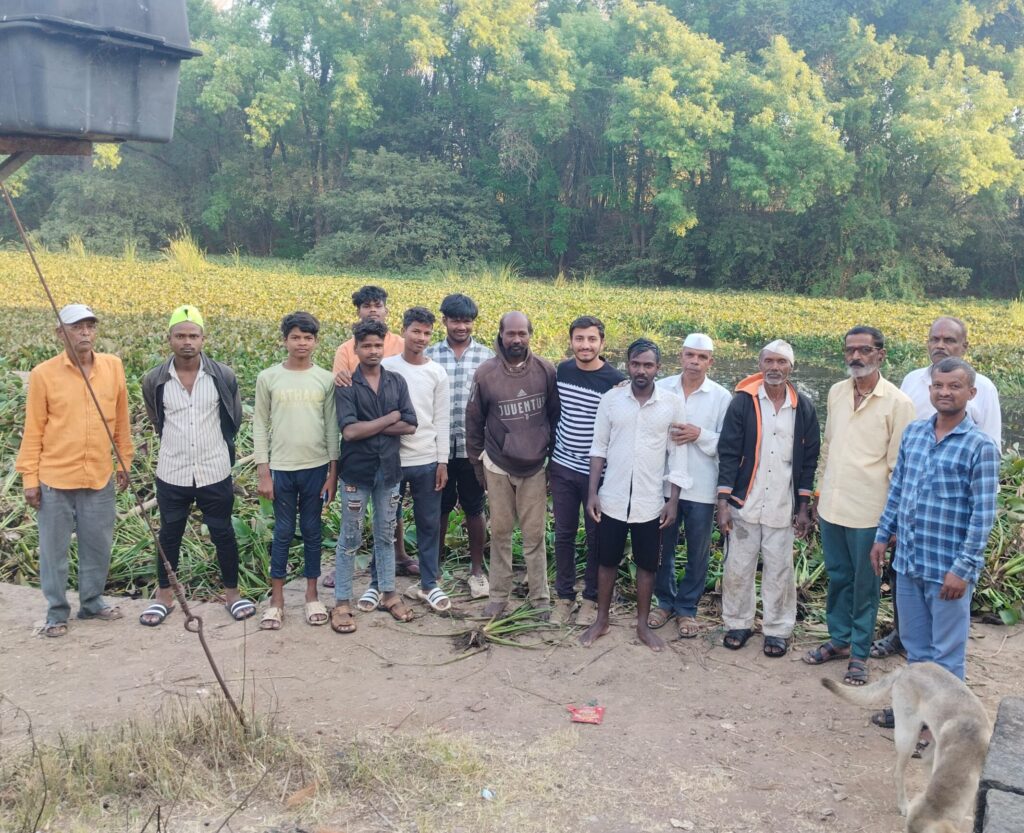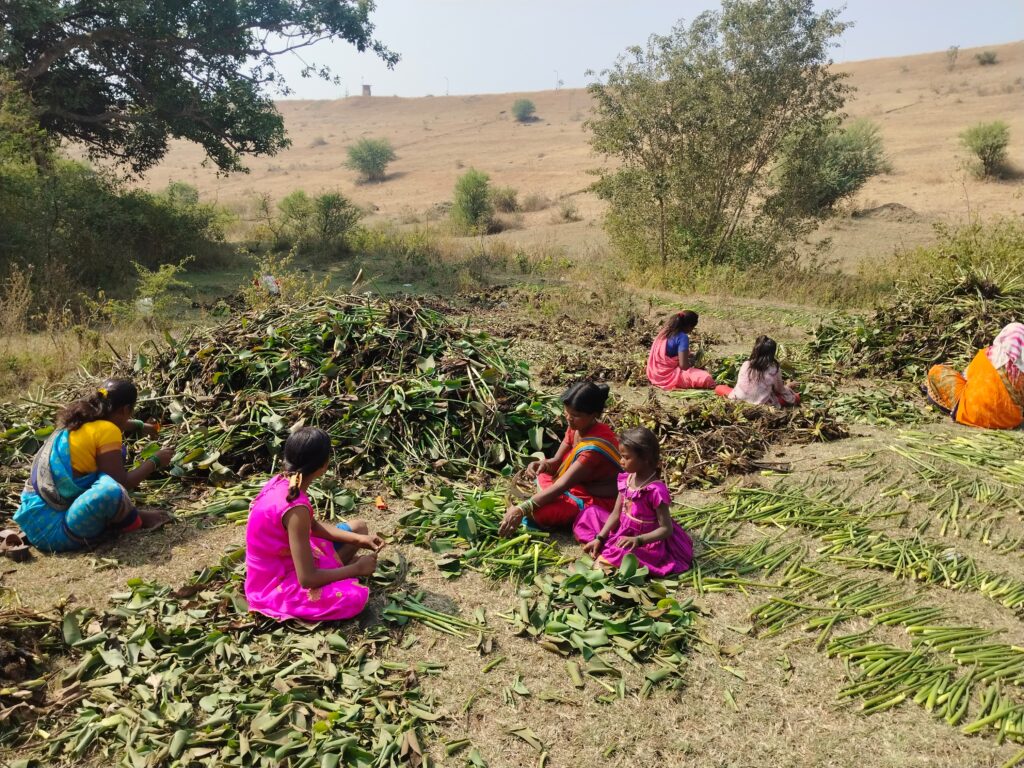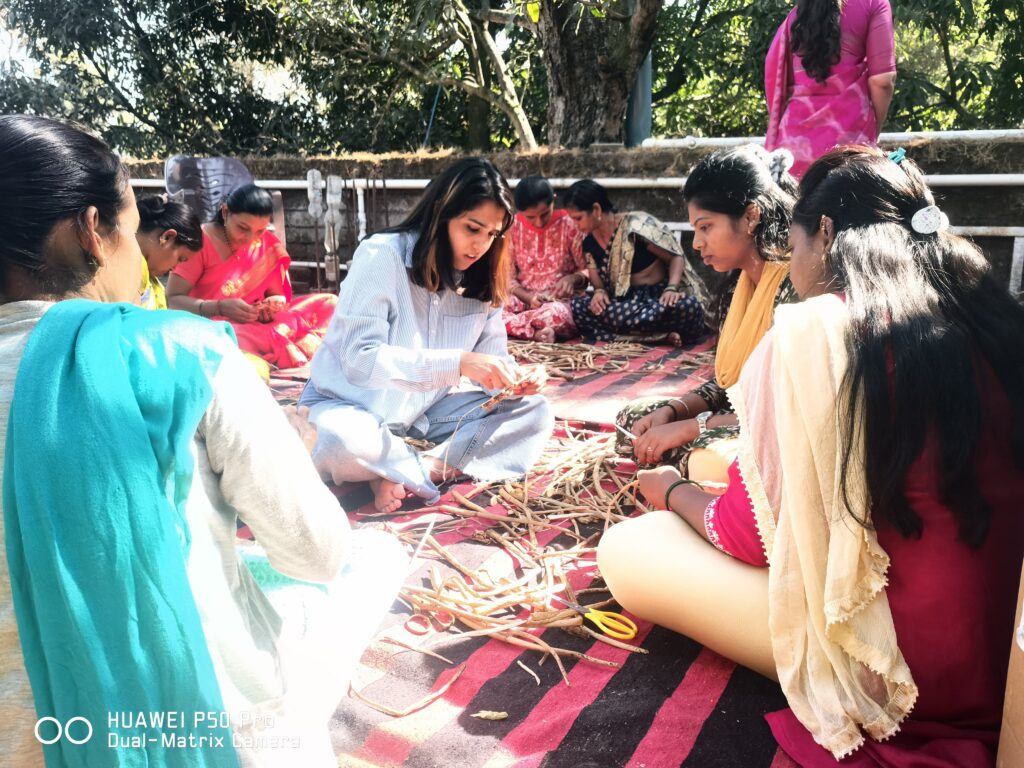2025
Natives
Educating the population about the importance of planting native trees. Spreading awareness through education and social activities that run throughout the year.
2020
Coral Maternity
Conservation and restoration of the coral reefs along the Indian peninsula. Coral maternity is a project that uses ex-situ arrangements to grow damaged corals before replanting in conservation reefs.
2025
Beeing Human
Bees are known as ecosystem safe-keepers and are the primary agents to carry the plants pollen. The bee population has seen a steep decrease since 2005-2006.
2025
Rocky Adobe
Vultures are the scavenging birds of prey and are found everywhere in world except Australia and Antarctica.
2025
Mahseer Conservation
Tor (a genus of Cyprinid) Once a popular gamefish also known as Mahseer, struggles for its survival due to variety of reasons and habitat destruction.
Project: Natives
Start deadline : 2019
It has been well noticed by every one on this planet about the ill-effects that global warming has brought to us. Balancing the nature to what it was centuries ago can only give us a hope to get things back to normal, before they slip out of hand. This project, with the help of the locals and volunteers aims in planting all the native trees, plants and bushes which will attract the local birds and provide a breeding ground that has been lost over the period. The work is currently restricted to Western Maharashtra, notably the Sahyadri Ranges.
Facts : There are only 28 trees per head in India , as compared to 8953-Canada, 4461-Russia, 716-USA and 102-China. India ranks amongst the lowest, being in the subtropical belt, being amongst the very few countries to experience 4 months of rainfall and yet the least of trees per head count! No wonder that some parts of India (non-desert region) experienced 51 degree Celsius in 2019! Don’t think to take a decision. Just plant a tree. If you can’t, we will for you! Support us!
Nature of help:
You can help be a part of this work by doing either of the following
Donate by clicking on link. (One sapling growth and care costs around 15-20 INR). You can donate for any number of saplings you want to.
By sending seeds of the following trees at the mentioned address: Arjun, Peepal, Banyan, Neem, Babul, Red Cotton Silk, Forest Fire
By volunteering for plantation activities carried out at first week of every month.
Project: Coral Maternity
Started : 2020
Corals were the earliest of the indicators of the global warming threat. Global warming has affected the great barrier reef corals with various instances of coral bleaching have been noticed. These warm water corals provide habitat, breeding grounds and shelter to as many as one quarter of marine species, and occupy 1% of the worlds marine environment. There are chances of bleaching to happen more in the future, which can see many of these corals becoming extinct.
India has its own share to the 1% of the coral marine environment, and are under threat like the rest of Indonesian Pacific corals or the Great Barrier Reef.
Coral maternity is a program that provides human intervention for propagating these existing coral colonies in similar environment, grow them and plant back in the seawater, thus ensuring that no species is left to go extinct.
This step may not be sound doing a remarkable work, but it is actually saving the ecosystem by taking steps in the right direction in the right time!
Coral Maternity Lab: Department of Fisheries, Yashvantrao Chavan Institute of Science, Satara. Contact Person: Dr. Neha Bendre (Email)
Nature of help: You can help be a part of this work by doing either of the following
- Donate by clicking on link.(Coral Program requires high end equipment’s for inland maternity.)
- Donate High PAR Lighting, Equipments like Wavemaker, Skimmer, Pumps, etc
- By volunteering for maintenance services carried out at last week of every month @Coral Maternity Labs
Nature of help:
Nature of help: You can help be a part of this work by doing either of the following
Donate by clicking on link. (Coral Program requires high end equipment’s for inland maternity.)
Donate High PAR Lighting, Equipments like Wavemaker, Skimmer, Pumps, etc
By volunteering for maintenance services carried out at last week of every month


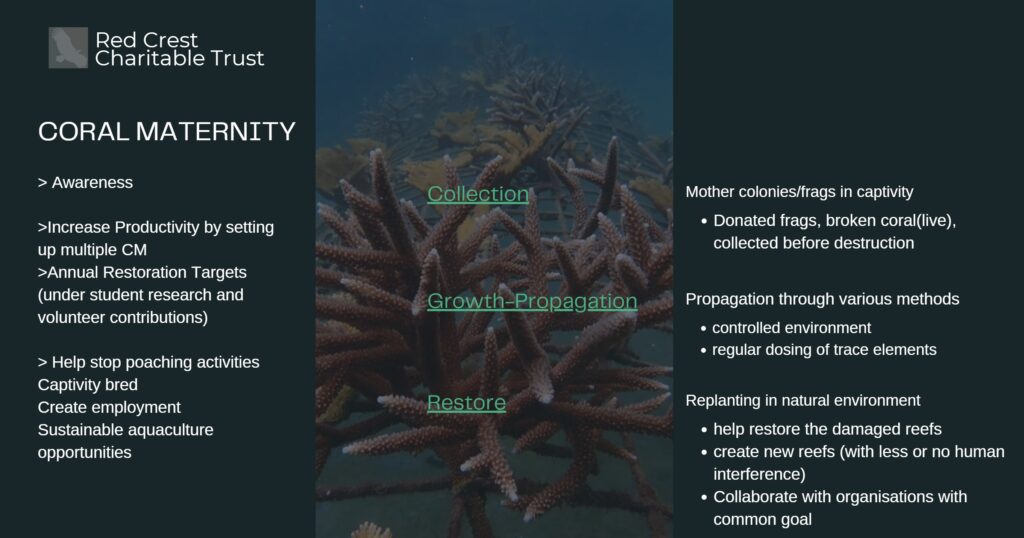
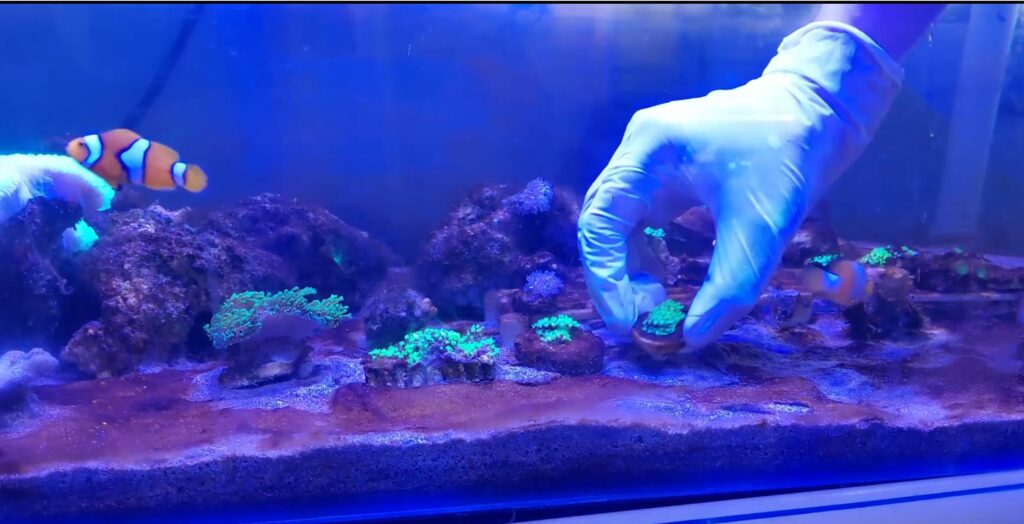



Project: Beeing Human
Started : 2020
Bees are known as ecosystem safe-keepers and are the primary agents to carry the plants pollen. The bee population has seen a steep decrease since 2005-2006. Though they may be tiny creatures who are often ignored or not felt, their disappearance or decline can lead to potential drastic conditions like famine and other crisis. The total disappearance can also mean that man can survive only for four years on this planet! The main threats include varoa mites, use of pesticides and loss of habitat. Of the various species available, it is very much essential to conserve the native bee population and spread awareness amongst citizens.
Beeing Human program aims in balancing the natures creations which are lost over time period, spread awareness amongst the remote area inhabitants, and encourage bee keeping in urban societies. This will also encourage women empowerment at rural and remote areas where conservation work is still possible. Cities today can only inhabit human beings.
Nature of help:
Nature of help: You can help be a part of this work by doing either of the following
Donate by clicking on link.(for Setup of apiary units at various places and automated monitoring)
Donate FLOW hives. You can ship these to the following address.
By leasing out land at your bungalows/farmhouse and actively set up apiary, helping easier database management.
By volunteering for plantation activities carried out at first week of every month
Project: Rocky Abode
Start deadline : 2024
Vultures are the scavenging birds of prey and are found everywhere in world except Australia and Antarctica. Of the rest continents, the vultures, especially in India have declined rapidly since 1990. Their breeding grounds continue to decline making them an endangered species. In the history there have been various animals that have been extinct because of the human practices and selfish interests. There is a need to act as long as we have time to restore their population above endangered limits.
Rocky Abode is a project that targets monitoring the vultures and encouraging growth in their population through minimalistic human intervention. It targets the vulture on the Deccan plateau and the Western Ghats.
Nature of help:
Nature of help: You can help be a part of this work by doing either of the following
Donate by clicking on link
By volunteering for plantation activities carried out at first week of every month
Project: Mahseer Conservation
Start deadline : 2024
The upper reaches of the Krishna river are a spawning ground for several fish species including Tor Khudree. However, the river is overrun by Water Hyacinth. Rapid growth of water hyacinth is a result of high concentration organic waste as untreated sewage gets directly discharged in the river. The Tor Khudree was on the IUCN endangered list till August 2019 and it has been long eliminated from Mula-Mutha basin which is another historic habitat. With dams affecting the natural breeding of many endemic fish varieties, the growth of weed plants (like water Hyacinth) has caused major damage to the river ecosystem. Invasive water hyacinth cuts down the light and oxygen absorption for the other species living in water. Tor Khudree being an apex predator in the ecosystem is one of the important species, that depends on clean and oxygen-rich water for spawning, getting highly affected by Eichhornia Crassipes. Project focuses in multiple actions like eradication of water hyacinth (setting up a process that can be implemented nationwide) and setting up breeding facilities of these endemic fishes in the Sahyadri river basin.
This project is backed by The Habitat Trust – Seed Fund 2024. Institutional Support: Yashwantrao Chavan Institute of Science (Dept. of Fisheries) , Satara
Nature of help:
Nature of help: You can help be a part of this work by doing either of the following
Donate by clicking on link
By volunteering for plantation activities carried out at first week of every month

